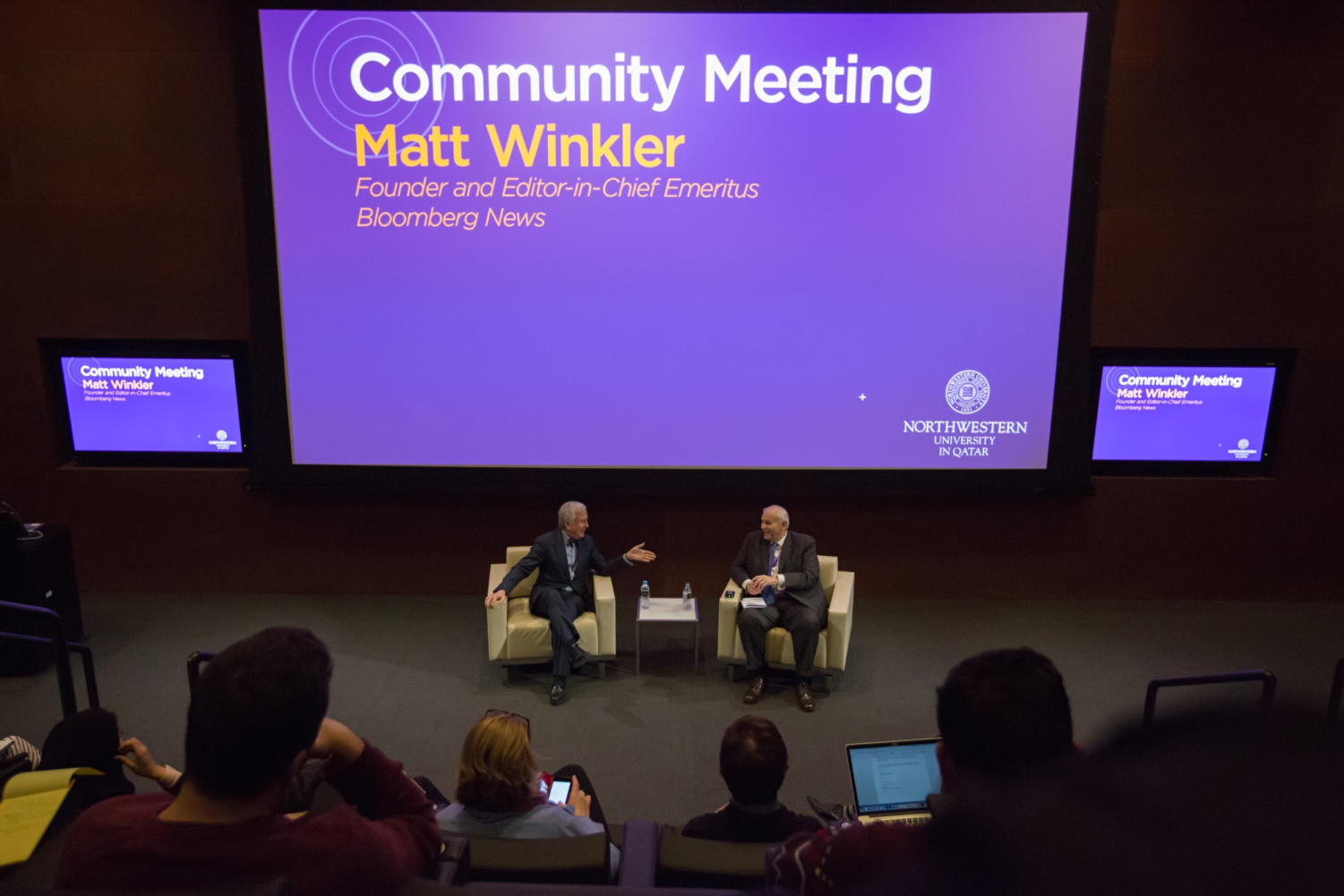Co-founder of Bloomberg News visits NU-Q

“My first paid job was when I delivered newspapers at the age of four to 150 customers… and it was exhilarating, to be the one to deliver ‘this just-in,’” said Matthew Winkler, co-founder and emeritus editor-in-chief of Bloomberg News, who spoke at Northwestern University in Qatar on Jan. 18, 2018.
Winkler discussed his early years as a journalist and how he worked with Michael Bloomberg, CEO of a financial software company Bloomberg, to develop its news media division, Bloomberg News.
Before becoming one himself, Winkler was inspired by journalists who had left a mark on the world, ones who “covered wars, and opened people’s eyes to the horror of war.” This deepened his passion for journalism until he was no longer satisfied by merely delivering the news. He wanted to be writing it.
As a young journalist, Winkler began working for The Wall Street Journal. Nine years later in 1989, he wrote a journalistic piece that instigated his move to Bloomberg, which at that time was only a financial software and data company. It had been in operation since 1981.
The piece Winkler wrote spoke about how Bloomberg’s small staff was doing with “financial information what news companies should have been doing.” This perspective seemed somewhat unflattering for his own newspaper, and its brazenness caught Bloomberg’s attention.
After reading it, Bloomberg called Winkler and asked, “What does it take to get into the news business?”
This presented a unique opportunity for Winkler who was excited with how “[Bloomberg] was doing things with data that were enormously important to news,” and his intention was to marry Bloomberg’s use of data with his experience in journalistic writing.
“Five reporters in London, five reporters in New York, and five reporters in Tokyo,” was Winkler’s response.
Bloomberg’s reply was simple: “When can you start?”
Bloomberg News was founded in 1990. Winkler’s main goal was to use Bloomberg’s data storage and unfold it to extract the value of the data to the public. He wanted to give context and perspective on the economy, assets and markets.
In 1998, he developed the Bloomberg Way, a guide for business and finance journalists. According to Winkler, this guide, in its simplest form, comprised the Five Fs: the first, most factual, fastest, final and future word.
In essence, this meant that Bloomberg News’ journalists should be the first and fastest to break a story, should do so factually, should be the final authority and should discuss the contextual future of the news they covered.
Another factor that contributed to the success of Bloomberg, according to Winkler, was the nature of its customers: a wealthy, powerful group who impacted the business world the most. Catering to this group by covering the commodity and stock markets meant Bloomberg News was “connected to the most important news that is driving the world,” he said.
But one challenge Bloomberg News faced was the limited number of employees, which made it harder to compete with the giant news organizations in the United States.
To succeed, they had to come up with a unique business plan that offered something new and unparalleled to the audience. The plan, in its beginning phases, included aggregating news from other organizations, offering more advertising space to companies to garner additional revenue for Bloomberg News, and assigning beats to a handful of reporters to cover the stock, bond and currency markets with greater speed and depth.
The potential for growth and success for today’s generation of young journalists brought Winkler to Qatar and NU-Q specifically, he said.
Speaking to the Daily Q, he said, “[NU-Q students] are the future and what makes us hopeful. And so, I really do want to be part of the solution. If I want the world to become better, then I ought to be engaged with people who are going to determine the future.”
As final advice to aspiring journalists, Winkler quoted his colleague Bloomberg, and said, “when people are going left, look right.”
“Sometimes the things that are out of favor or unfashionable or obscure” are what allow for the most growth, Winkler added.












